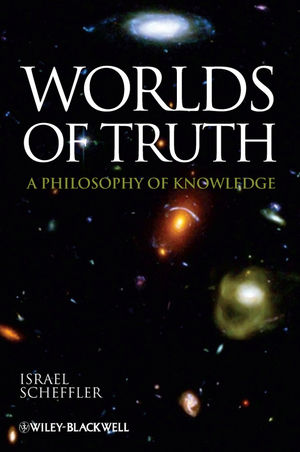Worlds of Truth: A Philosophy of KnowledgeISBN: 978-1-4051-9170-8
Hardcover
168 pages
April 2009, Wiley-Blackwell
 |
||||||
Preface viii
Acknowledgments x
Introduction 1
Part I: Inquiry 5
Chapter 1: Justification 7
1. Beliefs 7
2. Access to truth 8
3. Cogito ergo sum 9
4. Mathematical certainty 11
5. Classical logic 12
6. C. I. Lewis’ empiricism 14
7. Access as a metaphor 17
8. J. F. Fries and K. Popper 18
9. Voluntarism and linearity 19
10. One-way justification 20
11. Beginning in the middle 21
12. Justification, contextual and comparative 22
13. Justification in the empirical sciences 23
14. Circularity versus linearity 25
15. Democratic controls 25
16. Interactionism 27
Chapter 2: Truth 30
1. Allergy to absolute truth 31
2. Provisionality and truth 32
3. Truth versus verification 34
4. Truth and fixity 36
5. Transparency, Tarski, and Carnap 38
6. Truth and certainty 42
7. Sentences as truth candidates 44
8. Theoretical terms 44
9. Varieties of instrumentalism 45
10. Pragmatism and instrumentalism 45
11. Systems, simplicity, reduction 46
12. Crises in science 51
13. Reduction and expansion 52
Chapter 3: Worlds 55
1. Philosophies of truth 55
2. Operationism and truth 57
3. Version-dependence 59
4. Differences among scientifically oriented philosophers 61
5. Monism, pluralism, plurealism 62
6. Realism versus irrealism 66
7. A theory of everything 72
8. The status of ethics 75
9. Emotive theories; Ayer and Stevenson 75
10. Moore’s ethical intuitionism 77
11. Dewey and ethical naturalism 79
12. Symbol, reference, and ritual 81
Part II: Related Pragmatic Themes 93
Chapter 4: Belief and Method 95
Introduction 95
1. Problems of pragmatism and pragmatic responses 98
2. Peirce’s theory of belief, doubt, and inquiry 102
3. Peirce’s comparison of methods 104
4. Difficulties in Peirce’s treatment 106
5. An epistemological interpretation 108
6. The primacy of method 109
Chapter 5: Action and Commitment 114
Chapter 6: Emotion and Cognition 125
1. Emotions in the service of cognition 126
2. Cognitive emotions 132
Index 143



